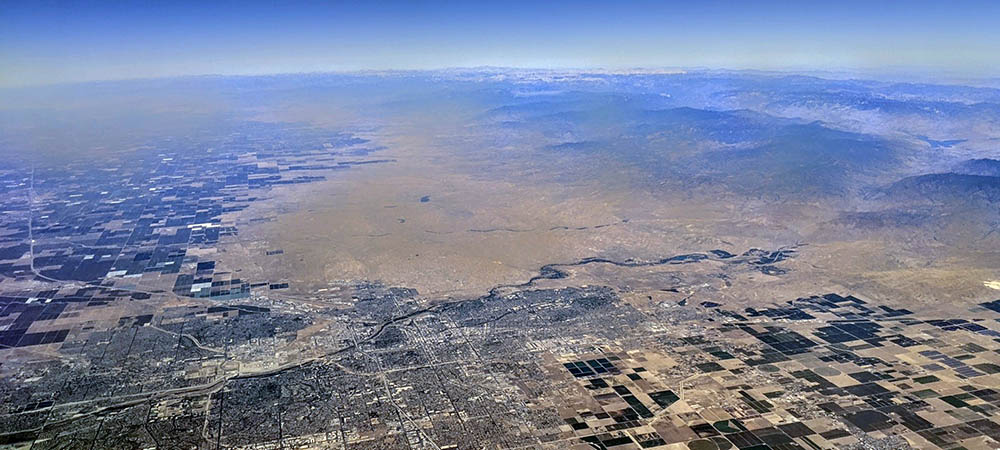
(Photo: Dicklyon/Wikimedia Commons)
Kern County is a unique place. In this slice of inland California, we are immensely proud of our economy, our history, and a culture that at times sets us apart from coastal California. And we’re strong enough to recognize that our region faces real challenges that must be addressed.
We believe emphatically that inclusive growth is the solution to our region’s economic challenges.
Industries like aerospace and energy, that have been the historic foundation of our growth and economic mobility, are up against significant obstacles from both market and public policy forces.
At the same time, industries that provide lower wage jobs with less upward mobility have expanded. The result is stagnating wages and workforce skills, innovation and entrepreneurship lag behind our peer regions.
Like many of California’s inland regions, there is a general uneasiness among local residents. A poll we commissioned last summer found that just 41% of our neighbors believed that the next generation would have more opportunities to be successful.
Faced with these harsh realities, a diverse group of business, government and civic leaders came together in April 2020 to launch “A Better Bakersfield and Boundless Kern,” also known as B3K. Partnered with an advisory team from the Brookings Institution and others, our goal is to develop a joint strategy and investment plan to generate economic growth and opportunity that is accessible to all residents.
The B3K effort grew out of California Forward’s 2019 Regions Rise Together strategy sessions conducted in partnership with the Governor’s Office of Planning and Research and the Office of Business and Economic Development (GO-Biz).
While launching this initiative in the midst of a pandemic may have seemed foolhardy, it actually served to catalyze collaboration and propel the action needed to achieve real change.
Last year, B3K established a goal to reduce the number of children who live in poverty in the Bakersfield-Kern region in half by 2030.
In April 2021, we released the B3K Market Assessment, which quantified how far we have to go. More than half of Bakersfield-Kern residents struggle to make ends meet and there are deep racial inequities among struggling workers.
The Market Assessment supplied the data and analysis needed to set measurable objectives we are now using to build tactical implementation plans to expand prosperity.
In order to achieve our goal, we need 99,500 additional high-quality jobs – those that provide stable employment, middle-class wages and benefits, and upward mobility – within 10 years, growing or upgrading 30% of our current job base.
Since releasing our Market Assessment, we’ve launched five Workgroups focused on Energy, Aerospace, Advanced Manufacturing, Business Services and Entrepreneurship and Business Support, as well as an additional Deep Prosperity Committee. All six are developing specific tactics and operating plans to help move us towards our goal of inclusive growth.
The groups include representatives from diverse backgrounds, including historically underrepresented stakeholders and community groups. All of this is by design. To develop a roadmap and action plan for inclusive growth and deep prosperity we must have equitable representation and engagement in today’s planning efforts.
Late last month, we reached a milestone: the first “live” B3K Steering Committee. After a year of meeting via Zoom, a group of nearly 100 stakeholders met in-person for the first time for an update on our process and the opportunity to review and provide feedback on the current drafts of plans developed by our Working Groups and Committees.
The dynamism in the room was palpable, as Bakersfield-Kern residents from all walks of life and sectors of society came together to continue building a shared vision for our future.
This approach is what sets apart B3K and similar initiatives across the state — like those taking place in the Salinas Valley and Fresno — compared to traditional economic development planning efforts. Through these efforts, we are demonstrating that the future is not set in stone. Starting on the path towards deep prosperity, let alone achieving and sustaining it, takes an unprecedented amount of collaboration.
As we move forward, much work remains. The immediate challenge ahead is arriving at a clear framework for collective action. Simultaneously, we are working to identify investment funding for the opportunities unearthed through the B3K process, positioning ourselves to attract private and public investment from sources like the Community Economic Resilience Fund included in the just passed state budget.
While every part of California is unique, many of our state’s inland regions face similar challenges to achieving deep prosperity and inclusive growth. As the economy continues its recovery from the crippling effects of the COVID-19 pandemic, there is a real danger — in some ways already realized — that vast swaths of our people and geographies will be left behind.
All of us, but especially those from California’s inland regions, must come together to build a future where we all have the opportunity to enjoy the prosperity and bounty of the Golden State.
Kristen Beall Watson is President and CEO of the Kern Community Foundation, and Nick Ortiz is President and CEO of the Greater Bakersfield Chamber of Commerce. Both are part of the B3K core team as well as members of the California Stewardship Network.

